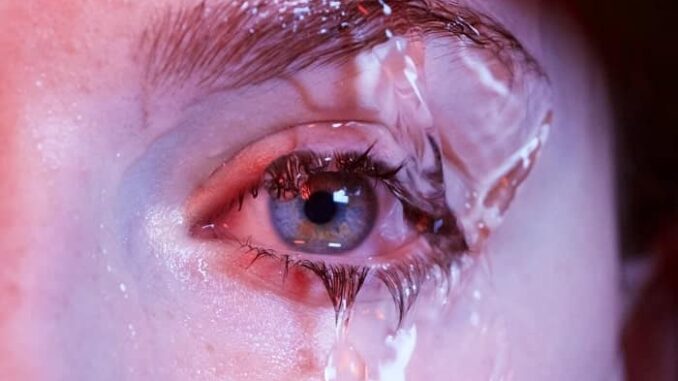
It’s no secret that smoking cannabis can cause red eyes. Drinking is also sometimes noticed by an unusual dilation of the pupils. When it comes to cannabidiol (CBD), extracted from industrial hemp plants, the name given to legal cannabis, the question legitimately arises. Can CBD cause red eyes? ? Beyond that and in general how does cbd interact with the eyes ? This is our topic of the day.
Why do cannabis users have red eyes?

Red, watery eyes are a side effect of cannabis use
When we think of a stoner, there’s a good chance that the long-haired, red-eyed hippie cliché will pop up in our minds at some point. Beyond the cliché, however, there is one proven risk of red, swollen or watery eyes on the side effects of cannabis. However, this phenomenon is mainly related to marijuana useunderstand cannabis with a high THC content and therefore illegal.
A common misconception is that the red-eye phenomenon is caused by smoking and therefore smoking CBD (which, remember, is prohibited) or even vaping could cause consumers to experience red eyes. However, it is not the smoke that is to blame.
Sometimes, when smokers have red or even glassy eyes, they also experience dizziness for the same reason. The culprit has a name: vasodilation. In fact, when we consume cannabinoids, our endocannabinoid system (SEC) gets activated. However, ECS sensors are present throughout the body, including in the eyes. When consuming THC, Blood vessels dilate. your extension increases blood flow in the affected areas, leading to the typical reddening of the eyeballs. Because of the increased blood flow blood pressure drops. That causes dizziness.
Moreover, these effects are attributable to simplicity THC consumption. Therefore, opting for edible cannabis rather than smoking it does not circumvent the problem.
Okay, so we’re set for THC’s fate, but what about CBD?
CBD confirmed

CBD does not suddenly cut off blood flow and therefore does not cause pooling of blood in the eyes
Let’s end the suspense: CBD does not count red eyes among its side effects currents. Unlike THC, CBD does not cause blood pressure to drop sharply after the initial spike, causing redness in the eyes. In fact, CBD has none no direct impact on the cognitive state of its user, except of course to relax it. An antagonist yet complementary to THC, CBD affects the way receptors bind to molecules, allowing certain neurotransmitters like serotonin to circulate freely. That allows himHelping consumers fight depression. So no red eyes, but virtuous effects (it’s analgesic, anti-inflammatory and relaxing, for example).
Thus, not only does CBD not cause eye irritation, but it is one effective and legal alternative to THC to take advantage of the properties of cannabis. It’s also possible to limit the appearance of red eyes by drinking water, resting, and possibly using eye drops.
Beyond red eyes, CBD could still have other eye effectswith some consumers reporting positive effects, for example in glaucoma.
CBD for the eyes: opportunities and limits
Red-eye is an embarrassing phenomenon as it is neither pleasant to bear nor unnoticeable. In fact, going out red-eyed is tantamount to embarrassing questions about his possible consumption of illegal products. However, it is not a health-threatening disorder. the eye diseases are nevertheless numerous and more problematic. Naturally, since THC is a natural vasodilator, its interest has led to much debate about the potential interest in THC Taking cannabinoids for eye problemsespecially in glaucoma.
CBD and Glaucoma

CBD is often mentioned as part of the treatment for glaucoma
Le Glaucoma is a common eye disease too much pressure in the eye. Unassisted it causes the progressive destruction of the optic nerve. Because marijuana has the ability to lower blood pressure, it was quickly considered to help people with glaucoma. However, it remains illegal in France, even for therapeutic purposes. But what about CBD?
As previously mentioned, CBD does not have the same properties as THC. That’s why it’s legal (it’s not psychoactive, not addictive and does not causeside effects majors). That’s why there are no red eyes. Finally, for this reason, unfortunately, it does not seem not suitable to treat glaucoma. Worse, a press release from the American Academy of Ophthalmology recommended not using CBD as a natural treatment for CBD. The paper is based on a December 2018 study by Indiana University researchers on mice. The conclusion is clear: a 18% increase in eye pressure was observed in mice treated with CBD-enriched drops.
This confirms that CBD is an antagonist of THC in many ways. Not only does it not seem to cure glaucoma, but in some cases it may make your symptoms worse. Therefore, if you have an eye problem, it is advisable to proceed systematically consult a doctorideally a specialist in ophthalmology.


